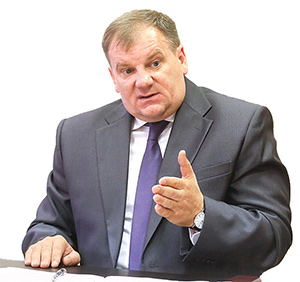Penitentiary institutions across Union State to be improved
The Union State Standing Committee is tackling the issue for the first time, looking at collaboration between Russian and Belarusian penitentiary services. From a humanitarian perspective, there is a desire to ensure decent conditions for those serving sentences, and to provide an element of rehabilitation, so they may integrate into society on release, rather than becoming hardened criminals. It is both a technical and a humanitarian problem, since prisoners must be kept isolated.

Sergey Doroshko, Head of the Department of Corrections of the Belarusian Interior Ministry:
In penitentiary institutions, we must protect teenagers from the harmful influence of mature criminals, while maintaining a system of “social lifts” for them and giving them a chance
Last October, in the Kazakh village of Burabay, presidents of CIS member states signed an agreement to establish the Council of Penitentiary Service Directors. The first meeting of the Council, dedicated mainly to organisational issues, took place on 9-10th June, in Moscow.
After less than a month, on 4th July, the Minsk headquarters of the Standing Committee liaised with Union State Secretary Grigory Rapota, to discuss specific areas of co-operation. Invited along was a researcher who doesn’t deal with penitentiary problems, the head of the headquarters of the National Academy of Belarus, professor Piotr Vityaz, who has a PhD in technical sciences. He has been invited to co-ordinate technical issues, including radio-electronic suppression of mobile phone conversations, so that criminal bosses cannot supervise criminal activities from jail. Both Russia and Belarus have the necessary technologies and qualified personnel to carry out this task.
Safety in places of detention is one of three priority areas for co-operation, alongside convicts’ health and juvenile offenders’ welfare. Whether these will become the focus of government programmes will be decided later.
Sergey Doroshko, Head of the Department of Corrections of the Belarusian Interior Ministry, set a humanitarian tone for the discussion, citing the example of a teenager committing an offence for the first time but gaining criminal knowledge on entering prison. When teenagers are sent to jail, their school education is interrupted, and they enter a ‘prison university’ instead. It seems obvious that young offenders should be protected from the harmful influence of mature criminals, being encouraged to turn a new page. Mr. Doroshko assures us that the Belarusian correction system is ready to move in this direction, with Government support. His Russian counterpart, Valery Maksimenko, the deputy director of the Federal Correction Service and Major General of Internal Forces, supports this opinion. As an example, he cites a mother of three from Moscow, who was detained at a pretrial detention facility for several months, for having stolen a piece of cheese.
The Union State Secretary, Grigory Rapota, notes that standards and methodology of juvenile offender welfare should be developed, taking into account international best practice. The next step is to estimate the cost of a programme and to invest in a new infrastructure. The State Secretary stresses the need to assess legislation in our two countries and to develop proposals for harmonisation. He underlines, “We can do it. We have the right of legislative initiative and there is the Parliamentary Assembly, to which we can pose these questions…”
Shortly after the Minsk meeting, necessary documents were signed and working groups created; real co-operation has begun.
By Victor Ponomarev











